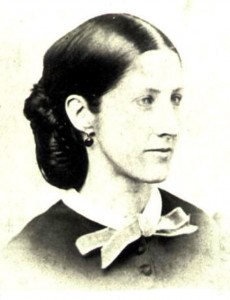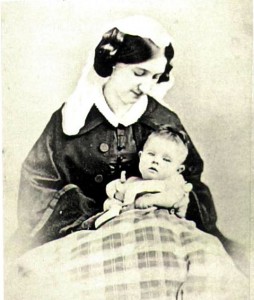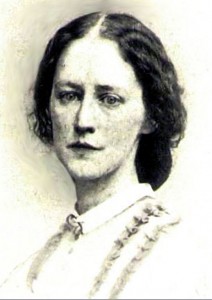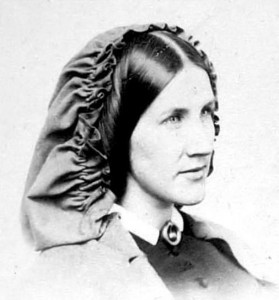The Woolsey Family
![]()
We are not aware of any other instance among the women who have devoted themselves to works of philanthropy and patriotism during the recent war, in which four sisters have together consecrated their services to the cause of the nation. In social position, culture, refinement, and all that could make life pleasant, Misses Georgiana and Jane C. Woolsey, and their married sisters, Mrs. Joseph and Mrs. Robert Howland, were blessed above most women; and if there were any who might have deemed themselves excused from entering upon the drudgery, the almost menial service incident to the Hospital Transport service, to the position of Assistant Superintendent of a crowded hospital, of nurse in field hospitals after a great battle, or of instructors and superintendents of freedmen and freedwomen; these ladies might have pleaded an apology for some natural shrinking from the work, from its dissimilarity to all their previous pursuits. But to the call of duty and patriotism, they had no such objections to urge.
![]()
 Mrs. Joseph Howland (Eliza Woolsey Howland) was the wife of a Colonel in the Union army, and felt it a privilege to do something for the brave men with whom her husband’s interests were identified, and accompanying him to the camp whenever this was permitted, she ministered to the sick or wounded men of his command with a tenderness and gentleness which won all hearts. When the invitation was given to her and her sister to unite with others in the Hospital Transport service, she rejoiced at the opportunity for wider usefulness in the cause she loved; how faithfully, earnestly, and persistently she toiled is partially revealed in the little work published by some of her associates, under the title of “Hospital Transports,” but was fully known only by those who shared in her labors, and those who were the recipients of her kind attentions. One of these, a private in the Sixteenth New York Regiment (her husband’s regiment), and who had been under her care on one of the Commission’s transports at White House, expressed his gratitude in the following graceful lines:
Mrs. Joseph Howland (Eliza Woolsey Howland) was the wife of a Colonel in the Union army, and felt it a privilege to do something for the brave men with whom her husband’s interests were identified, and accompanying him to the camp whenever this was permitted, she ministered to the sick or wounded men of his command with a tenderness and gentleness which won all hearts. When the invitation was given to her and her sister to unite with others in the Hospital Transport service, she rejoiced at the opportunity for wider usefulness in the cause she loved; how faithfully, earnestly, and persistently she toiled is partially revealed in the little work published by some of her associates, under the title of “Hospital Transports,” but was fully known only by those who shared in her labors, and those who were the recipients of her kind attentions. One of these, a private in the Sixteenth New York Regiment (her husband’s regiment), and who had been under her care on one of the Commission’s transports at White House, expressed his gratitude in the following graceful lines:
![]()
“From old St. Paul till now
Of honorable women, not a few
Have left their golden ease, in love to do
The saintly work which Christ-like hearts pursue.
![]()

“And such an one art thou? God’s fair apostle,
Bearing his love in war’s horrific train;
Thy blessed feet follow its ghastly pain,
And misery and death without disdain.
![]()

“To one borne from the sullen battle’s roar,
Dearer the greeting of thy gentle eyes
When he, a-weary, torn, and bleeding lies,
Than all the glory that the victors prize.
![]()

“When peace shall come and homes shall smile again,
A thousand soldier hearts, in northern climes,
Shall tell their little children in their rhymes
Of the sweet saints who blessed the old war times.”
On the Chickahominy, June 12th, 1862.
![]()
Impaired health, the result of the excessive labors of that battle summer, prevented Mrs. Howland from further active service in the field; but whenever her health permitted, she visited and labored in the hospitals around Washington, and her thoughtful attention and words of encouragement to the women nurses appointed by Miss Dix, and receiving a paltry stipend from the Government, were most gratefully appreciated by those selfdenying, hard-working, and often sorely-tried women—many of them the peers in culture, refinement and intellect of any lady in the land, but treated with harshness and discourtesy by boy surgeons, who lacked the breeding or instincts of the gentleman. Her genuine modesty and humility have led her, as well as her sisters, to deprecate any notoriety or public notice of their work, which they persist in regarding as unworthy of record; but so will it not be regarded by the soldiers who have been rescued from inevitable death by their persistent toil, nor by a nation grateful for the services rendered to its brave defenders.
![]()
 Mrs. Robert S. Howland (Mary Woolsey Howland) was the wife of a clergyman, and an earnest worker in the hospitals and in the Metropolitan Sanitary Fair, and her friends believed that her over-exertion in the preparation and attendance upon that fair, contributed to shorten a life as precious and beautiful as was ever offered upon the altar of patriotism. Mrs. Howland possessed rare poetic genius, and some of her effusions, suggested by incidents of army or hospital life, are worthy of preservation as among the choicest gems of poetry elicited by the war. “A Rainy Day in Camp,” “A Message from the Army,” etc., are poems which many of our readers will recall with interest and pleasure. A shorter one of equal merit and popularity, we copy not only for its brevity, but because it expresses so fully the perfect peace which filled her heart as completely as it did that of the subject of the poem:
Mrs. Robert S. Howland (Mary Woolsey Howland) was the wife of a clergyman, and an earnest worker in the hospitals and in the Metropolitan Sanitary Fair, and her friends believed that her over-exertion in the preparation and attendance upon that fair, contributed to shorten a life as precious and beautiful as was ever offered upon the altar of patriotism. Mrs. Howland possessed rare poetic genius, and some of her effusions, suggested by incidents of army or hospital life, are worthy of preservation as among the choicest gems of poetry elicited by the war. “A Rainy Day in Camp,” “A Message from the Army,” etc., are poems which many of our readers will recall with interest and pleasure. A shorter one of equal merit and popularity, we copy not only for its brevity, but because it expresses so fully the perfect peace which filled her heart as completely as it did that of the subject of the poem:![]()
IN THE HOSPITAL.
![]()
“S. S , a Massachusetts .Sergeant, worn out with heavy marches, wounds and camp disease, died in General Hospital, in November, 1863, in ‘perfect peace.’ Some who witnessed daily his wonderful sweet patience and content, through great languor and weariness, fancied sometimes they ‘could already see the brilliant particles of a halo in the air about his head.’
![]()
“I lay me down to sleep,
With little thought or care,
Whether my waking find
Me here—or THERE!
![]()
“A bowing, burdened head,
That only asks to rent,
Unquestioning, upon
A loving Breast.
![]()
“My good right-hand forgets
Its cunning now—
To march the weary march
I know not how.
![]()
“I am not eager, bold,
Nor strong—all that is past:
I am ready Not To Do
At last—at last!
![]()
“My half-day’s work is done,
And this is all my part;
I give a patient God
My patient heart.
![]()
“And grasp his banner still,
Though all its blue be dim;
These stripes, no less than stars,
Lead after Him.”
![]()
Mrs. Howland died in the summer of 1864.
![]()
Miss Georgiana M. Woolsey, was one of the most efficient ladies connected with the Hospital Transport service, where her constant cheerfulness, her ready wit, her never failing resources of contrivance and management in any emergency, made the severe labor seem light, and by keeping up the spirits of the entire party, prevented the scenes of suffering constantly presented from rendering them morbid or depressed. She took the position of assistant superintendent of the Portsmouth Grove General Hospital, in September, 1862, when her friend, Miss Wormeley, became superintendent, and remained there till the spring of 1863, was actively engaged in the care of the wounded at Falmouth after the battle of Chancellorsville, was on the field soon after the battle of Gettysburg, and wrote that charming and graphic account of the labors of herself and a friend at Gettysburg in the service of the Sanitary Commission which was so widely circulated, and several times reprinted in English reviews and journals, “Three Weeks at Gettysburg.”
![]()
A cousin of these ladies, Miss Sarah C. Woolsey, daughter of President Woolsey of Yale College, was also engaged during the greater part of the war in hospital and other philanthropic labors for the soldiers. She was for ten months assistant superintendent of the Portsmouth Grove General Hospital, and her winning manners, her tender and skilful care of the patients, and her unwearied efforts to do them good, made her a general favorite.
Charles William Woolsey, b. March 4, 1802, m. June 28, 1827 and Jane Eliza Newton , b. Nov. 9, 1801, Alexandria, Virginia). Charles William Woolsey perished in the Lexington on Long Island Sound, January 13, 1840, leaving a widow and eight children, the eldest twelve years old.
Children:
- Abby Howland b. 1828 at Aunt Rickett’s hous in Alexandria, Va, unmarried, lived in New York.
- Jane Stuart, b. ~1830, unmarried, lived in New York.
- Mary Elizabeth Watts, b. Jan. 1, 1832, m. June 16, 1853, Episcopal Rev Robert S, Howland, D.D. Rector of the Church of the Heavenly Rest, Fifth Avenue, New York. d. May 31, 1864, leaving behind her four daughters: Mary Woolsey, Abby Roberta, Una Felice (b. in Rome, Italy), and Georgiana.
- George Anne[1] (Georgiana) Muirson, b. 1833, married to Francis (Frank) Bacon , b. Sept. 5, 1831, M.D., of New Haven, Conn. graduated M. D. at Yale, and is the Professor of Surgery in that College—a son of the Rev. Leonard Bacon, D. D., L.L. D.
- Eliza Newton (1835 – 1917) married Col. Joseph Howland (1855), an author and amateur farmer at Matteawan, New York. After their honeymoon, Joseph and Eliza Howland moved to Tioronda, an estate Joseph bought along the banks of the Fishkill Creek in Matteawan, New York, present day Beacon, New York. During the American Civil War, Joseph joined the Sixteenth New York Volunteers and served until he was seriously wounded during the Seven Days Battles of the Peninsular Campaign.
- Harriet Roosevelt m. Jan. 7, 1869 to Henry (Hugh?) Lennox Dodge (Hodge?), M.D., of Philadelphia, Professor in the Medical Department of the University of Pennsylvania—the brother of the Rev. Charles Dodge D. D., LL. D.)
- Caroline Carson married Edward Mitchell, married Edward Mitchell, a graduate of Columbia College, a lawyer of New York, son of Judge William Mitchell of that city.
- Col. Charles William Woolsey b. April 18, 1840, m. April 25, 1867, Arixene Southgate Smith, b. Nov. 2, 1843, eldest daughter of Henry B. Smith, D. D., LL. D., Professor of Theology in the Union Theological Seminary, New York City, one of the foremost of American scholars, thinkers, authors, and his wife Elizabeth Lee, his biographer, daughter of William Allen, D. D., President of Bowdoin College. Col. Woolsey is a gentleman farmer at Briar Cliff, near Sing Sing, New York.
Then, just as all was brightest and best, came the appalling tragedy of my father’s sudden death by the destruction of the Sound steamer Lexington on the night of Jan. 13, 1840. Father had been to New York to visit Grandfather Woolsey, who had only lately given up his English home and come to end his days in his own country. Uncle Edward had just married his cousin, Emily Aspinwall and father was urged to stay on for a large family dinner about to be given in honor of the event, but he could not be persuaded to, saying : ” he had never been away one night from his wife and family for pleasure.” The night was a terrible one, the mercury at 10° below zero, the Sound filled with floating ice. Suddenly the alarm of fire was given. The boat was loaded with cotton bales, among which the fire had already made such headway that all hope of saving it was given up. Of the crew and one hundred and forty-four passengers only four es- caped. Our father was not among them. In an old family Bible in the library at Casinathe record of his death was entered in Grandfather’s own handwriting, with this added note : ” Whether he was burned or drowned God only knows.”
Over all that those days of agony meant for my mother, a veil must be drawn. No one ever dared to enter into the sorrow which in her heroic unselfishness she hid from us. In the midst of it, on the 18th day of April, 1840, her only son, Charles William Woolsey, was born,—the son his father would have so rejoiced to see!
Soon after, Mother gave up the Boston house and moved to Rutgers Place, New York, by the urgent advice of our dear Uncle Edward—always a tower of strength to her and to us all,—and of Grandfather, who at this time wrote to Mr. William Walton Woolsey: “Eliza looks to me as a father (there is much in that word), and site shall not be disappointed.”



